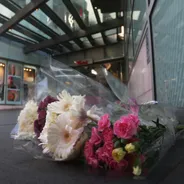When Julie Keith’s five-year-old daughter asked for a Halloween-themed birthday, little did they know that this would start a chain of events culminating in the release of some 160,000 people from forced labour camps on the other side of the world.
Remembering a $29.99 box of Halloween decorations in her loft, the Oregon mother retrieved the box and happened upon a note. Amongst the skulls, bones, spiders and tombstones, a note had been hidden by a worker from the factory.
However, as Julie soon found out, this wasn’t a regular factory. "Sir," the note began. In broken English, the message continued: "If you occassionally buy this product, please kindly send this letter to the World Human Right Organization. Thousands people here who are under the persicution of the Chinese Communist Party Government will thank and remember you forever."

Julie read on in horror and discovered that her Kmart graveyard kit had come from unit eight, department two of Masanjia labour camp in Shenyang, China. This was a well-known prison camp where, for less than two dollars a month, inmates worked for 15 hours a day, every day. Otherwise, as the note states, "they will suffer torturement, beat and rude remark.”
Furthermore, the reason that some of the prisoners were there was even more difficult to understand. Many were there for being members of the Falun Gong movement - a peaceful, spiritual community with a focus on meditation and tolerance.
However, as the movement gained momentum, the Chinese government had become fearful and began a smear campaign. Following a silent protest outside the ruling Communist Party's Beijing headquarters in 1999, Falun Gong was outlawed. "They often suffer more punishment than others," the note solemnly explained.

"I was kind of in shock," Julie told the BBC. "I just couldn't believe that something like that was here, in front of me." The note told of how inmates were held for between one and three years without a proper trial. It was not only a window into another world, but evidence that products sold in the US were the result of forced labour in China.
Julie posted a picture of the letter on Facebook, asking her friends what she should do. Having contacted a number of human rights charities, she received no reply. She then decided to take the letter into work - the Goodwill thrift store - and asked her company’s PR manager what to do.
The Oregonian, a local newspaper, was contacted. They sent an intern to interview Julie but the story wasn’t published. Having almost given up hope, two months later, the story was printed on the front page. It was Christmas 2012 and readers were full of generosity and intrigue. The story went viral and the phone was ringing off the hook.

However, amid the TV appearances and interviews, Julie was receiving a lot of criticism for having posted the letter in full. Surely the fate of this dissident, in unit eight, department two, was now sealed? "It crushed me," Julie explains.
"I felt like, at that point, I maybe had done the wrong thing,” she continues. “I felt terrible but I just kept referring back to the letter - this is what the writer wanted. He wanted me to publicise this." However, throughout the media furore, she wondered if she had done the right thing and - more importantly - whether the note’s author was still alive.
Then, in mid-2013, the New York Times got in touch. They had been in contact with a man who claimed to be the author of the note. Sun Yi was an oil and gas engineer by trade and, having seen a group of people exercising near his home, had happened upon Falun Gong by chance.

When it was banned by the government, the movement went underground. A culture under siege, Falun Gong’s followers were keen to keep it alive. However, during a crackdown in the run-up to the 2008 Beijing Olympics, Sun Yi was caught.
Thrown into a forced labour camp, he was privy to a plethora of human rights abuses. Having heard that inmates were sometimes tortured to death, he shuddered at the sight of people carrying what looked like human bones and skulls outside his unit. They were known as the Eighth Team, and they worked on what was called the "ghost job".
When Sun Yi was told he would be moving to this unit, his stomach flipped. He imagined he would be clearing up body parts of fellow inmates who had just been brutally killed. However, he soon learned that he would instead be making oddly morbid decorations.

The skulls and bones he had seen people carrying were fake and someone - somewhere - was buying all of this bizarre fare. Having never heard of Halloween, this was a confusing but ultimately relieving realisation. "He was wondering why people would buy this kind of scary stuff," states Canadian filmmaker Leon Lee, who worked with Sun Yi to tell his story. "Until one day a guard told him Western people have this kind of a culture, a so-called festival, and that's why they are making it."
Undoing the previous process, Sun Yi had to sit for hours scrubbing polystyrene headstones with a sponge - in order to make them look old and weathered. Before long, his hands and face were covered in black dye. Sun Yi would work from 4am until 11pm or sometimes midnight, stopping only to eat. It was repetitive, degrading work.
Furthermore, his wife had been in touch via letter. Constantly harassed by the authorities and prevented from gaining work, they would make her life unbearable for as long as she was married to him. She was getting a divorce.

Yet, despite everything, there was one thing which kept Sun Yi going. He was determined that the world needed to know what was happening here at the Masanjia "re-education through labour" camp. So, one night, he penned a letter in his best English.
He had to be extremely discreet. He couldn’t risk his peers finding out. However, as he slipped a note inside a box, one of the other inmates saw what he was doing. Doubling down, he told him everything. "Good," he said. "Do you have any more that I could help you hide?"
Before long, a number of Falun Gong followers were hiding Sun Yi’s notes. This was until one of his co-conspirators was caught. The guards knew he didn’t speak English, let alone write it. They tortured him but he never gave up Sun Yi’s name.

Although he dodged this bullet, he couldn’t avoid the next offensive against the Falun Gong. Forced to stand with his hands cuffed to a bunk bed, he was told to renounce the movement. If he fell asleep, the handcuffs would cut into this wrists. This was a standard exercise which Sun Yi hadn’t done anything specific to deserve.
However, eventually, Sun Yi was released. He carried on with Falun Gong and printing samizdat literature but aimed to fly under the radar. He had managed to bypass censorship measures so he could access western websites and, one day, stumbled upon Julie’s story.
"The New York Times contacted me and told me that they had been in contact with him and that they were doing a story," Julie explains. He had written a sequel to the original letter, but this one was just for Julie.

In it, he wrote "that he was very glad that I publicised the letter - that's exactly what he wanted", Julie states. "I was so thrilled - to know that he was alive, for one, and that he was proud of me and just knowing that I did the right thing."
Not long after the story had gone viral, a Chinese magazine called Lens had published an exposé and not long after that, 160,000 inmates from forced labour camps had been released. Julie, Sun Yi decided, was a woman he had to meet.
He and his ex-wife planned to remarry then flee the country. However, police soon raided her home and told her to let them know if Sun Yi contacted her. He was soon arrested but, in custody, his health deteriorated. He was therefore released and seized the opportunity to escape to Jakarta.

It was here, in self-imposed exile, that Julie met him. "It was like we had this instant connection," Julie says. "He called me his sister. It was like we'd known each other forever."
They exchanged gifts and Julie showed him the letter and the tombstone. "He seemed really thankful to bring all this back full circle," Julie states. "I really appreciate that she did that," Sun Yi told filmmaker Leon Lee, in an interview on camera. Weeping, he stated: "I don't know how to thank her. She feels like family."
However, it’s thought that he was then visited by a Chinese agent and - despite the fact that his life in Jakarta was causing far less of a toll on him - he soon died of kidney failure. "He had no kidney problems before,” Leon explains “and when I was there in Indonesia he seemed perfectly healthy."

“I so badly wanted a happy ending for him," Julie says. "He was the most resilient, strong person I have ever met - for someone to go through what he did and come out and be able to talk about it and share his experiences with the world - it's just incredible."
While the Chinese government has ended their "education through labour” scheme, the practise continues under different guises - as do widespread human rights atrocities. According to United Nations estimates, China now has 1,000,000 people in prison camps - for being Muslim.












